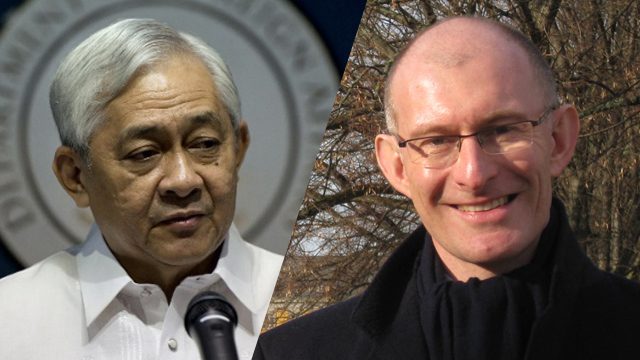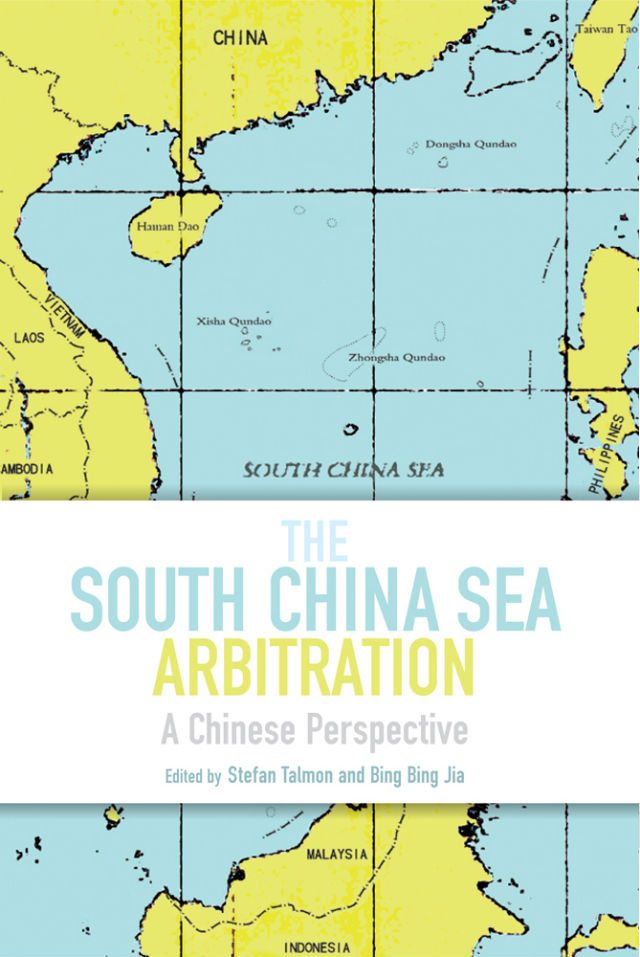SUMMARY
This is AI generated summarization, which may have errors. For context, always refer to the full article.

MANILA, Philippines – He wrote a book that serves as China’s “friend of court.” Through the Chinese media, he dismissed the Philippines’ historic case against China over the West Philippine Sea (South China Sea).
International law professor Stefan Talmon, one of China’s leading defenders in the South China Sea dispute, also likely influenced then Solicitor General Francis Jardeleza in a decision that could have jeopardized the Philippines’ case, a Supreme Court (SC) justice said. (READ: The inside story: Jardeleza accused of disloyalty to PH)
Talmon’s name surfaced during the meetings of the Judicial and Bar Council (JBC), which screens nominees to the judiciary, when the JBC discussed the “integrity issue” hounding Jardeleza.
Jardeleza became an SC associate justice on Wednesday, August 20, even as Chief Justice Maria Lourdes Sereno, who administered his oath of office, questioned his loyalty to the country. (READ: Jardeleza’s SC entry and Sereno’s eroding clout)
The integrity issue involved Jardeleza’s decision to exclude Itu Aba, the largest island in the Spratly Islands in the West Philippine Sea, from the Philippines’ nearly 4,000-page pleading or memorial against China.
Experts said excluding Itu Aba would favor China.
Sereno, the JBC’s ex-officio chair, described a discussion of Itu Aba as “pivotal.”
She also “explained that the country absolutely needed to discuss this physical feature in the memorial, so much so that the international lawyers handling the case were effectively threatening to resign should the petitioner insist on excluding any discussion of Itu Aba, because to do so would be to cause the loss of the country’s claim,” the JBC said in its comment-reply filed before the SC on August 15 after Jardeleza petitioned the high court to include him in the short list for SC justice.
The Philippines’ Washington-based lawyers, Paul Reichler and Lawrence Martin, said a similar thing in a memorandum sent to Jardeleza and Philippine Foreign Secretary Albert del Rosario on March 19. Reichler and Martin argued: “If we do not mention Itu Aba in the memorial, the tribunal will come to the same conclusion as China’s advocates: that the Philippines is ignoring it because it harms us.” (READ: Philippines’ lawyer vs China: Jardeleza ‘man of integrity’)
Incompetence or disloyalty?
In its comment-reply, the JBC noted a key factor that convinced Jardeleza to exclude Itu Aba.
A JBC member, retired Court of Appeals Associate Justice Aurora Lagman, said Jardeleza “mentioned that someone told him that a German scholar advised its exclusion.”
Quoted by the JBC, Carpio “opined that there could only be one German scholar referred to by the petitioner, Professor Talman (sic), who wrote in his work that the tribunal does not have jurisdiction over the case because Itu Aba was never raised nor mentioned by the Philippines in its earlier pleadings.”
Carpio “stressed that it was known in the international community that Professor Talman (sic) has been engaged by China to write for it and to promote its cause.”
Talmon, an Oxford University and Cambridge University graduate, works as director of the Institute for Public International Law at the University of Bonn. He also teaches public international law in the same school, after having taught the same subject at the University of Oxford.
Who is Paul Reichler: The Philippines’ lead counsel
- Co-chair of International Litigation and Arbitration Department of FoleyHoag, a 7-decade-old law firm in the United States
- Cum laude graduate from the Harvard Law School in 1973
- Lead counsel of Bangladesh in a maritime case that Bangladesh won over India in July 2014
After mentioning Talmon’s name, Carpio also said he “found it inexplicable” that Jardeleza excluded Itu Aba from the memorial, “even when its inclusion was already strongly advised by the best international lawyers.”
“When asked if he knew what motivated petitioner to move strongly against any discussion on Itu Aba, Senior Associate Justice Carpio said he did not. He stated that he could only think of two reasons: either incompetence or disloyalty. He confirmed that he believed petitioner to be a competent person. When asked to confirm a statement delivered during his remarks to the new lawyers for 2014, wherein he stated that a government lawyer’s disloyalty to the republic in the conduct of an international arbitration was treason, he said that yes he believed it was treason,” the JBC recalled.
Rappler e-mailed Jardeleza to ask if he got from Talmon the advice to exclude Itu Aba. The newly appointed SC justice has not replied to the e-mail. Earlier, Rappler also repeatedly texted and called his phone for his side on the JBC issue, but got no reply.
Sources in the judiciary said it was suspicious for Jardeleza to cite Talmon, when the Philippine government had already hired the services of Washington-based lawyers led by Reichler.

‘Amicus curiae brief’
Talmon, after all, wrote a book that “aims to offer a (not the) Chinese perspective on some of the issues to be decided by the tribunal and thus to assist the tribunal in meeting its obligations” under the United Nations Convention on the Law of the Sea (UNCLOS).
Published in February 2014, the book is titled “The South China Sea Arbitration: A Chinese Perspective.”
“The book does not set out the official position of the Chinese government, but is rather to serve as a kind of amicus curiae brief advancing possible legal arguments on behalf of the absent respondent,” the book’s publisher, Hart Publishing, said in its description.
“Amicus curiae” means “friend of the court,” a third party whom a court can consult.
This amicus curiae brief “on behalf of the absent respondent” comes as China rejects the historic case filed by the Philippines. China has said it will not reply to the Philippines’ memorial against China by December 15, as required by the arbitral tribunal.
Core of China’s arguments
In its description, Hart Publishing also said the book “does not deal with the merits of the disputes” between the Philippines and China, “but focuses on the questions of jurisdiction, admissibility, and other objections which the tribunal will have to decide as a preliminary matter.”
It is important to note that the book deals with jurisdiction.
China’s main arguments vs Philippines:Read more.
- Disputes involve land, which is not covered by UNCLOS
- Disputes involve the delimitation of maritime boundaries, over which China had rejected arbitral proceedings
This is the core of China’s arguments against the Philippines: The tribunal has no jurisdiction over the Philippines’ case or, in other words, has no right to hear the case in the first place. (READ: PH faces major hurdle in China case)
The publisher’s description says, “The book will show that there are insurmountable preliminary objections to the tribunal deciding the case on the merits and that the tribunal would be well advised to refer the dispute back to the parties in order for them to reach a negotiated settlement.”
This line echoes China’s call for one-on-one talks between the Philippines and China, instead of moves that involve a third party, such as arbitration.
Repeating similar arguments in the Chinese state-run paper Global Times, Talmon noted that several key points in the Philippines’ case cannot be addressed “without considering matters outside the jurisdiction of the tribunal.”
“There is thus no case to answer for China. The tribunal would be well advised to decline jurisdiction in the present case,” Talmon said.
These statements – through Talmon’s book and other outlets – form part of China’s legal but out-of-court warfare. (READ: China’s strategy vs PH: Trial by publicity)
While China rejects the arbitration process, veteran China analyst Chito Sta Romana said it continues “to argue in their media and in their statements.”
“This effort appears to be aimed at influencing the outcome of the tribunal, as well as preparing the Chinese public and the international community for any eventuality,” Sta Romana said on April 2.
A Filipino journalist who worked for more than 3 decades in China, Sta Romana explained: “What they’re trying to do is that on the one hand, they will not participate in the process. On the other hand, from the outside, they present their case, hoping to influence the arbitrators.” – Rappler.com
Add a comment
How does this make you feel?
There are no comments yet. Add your comment to start the conversation.